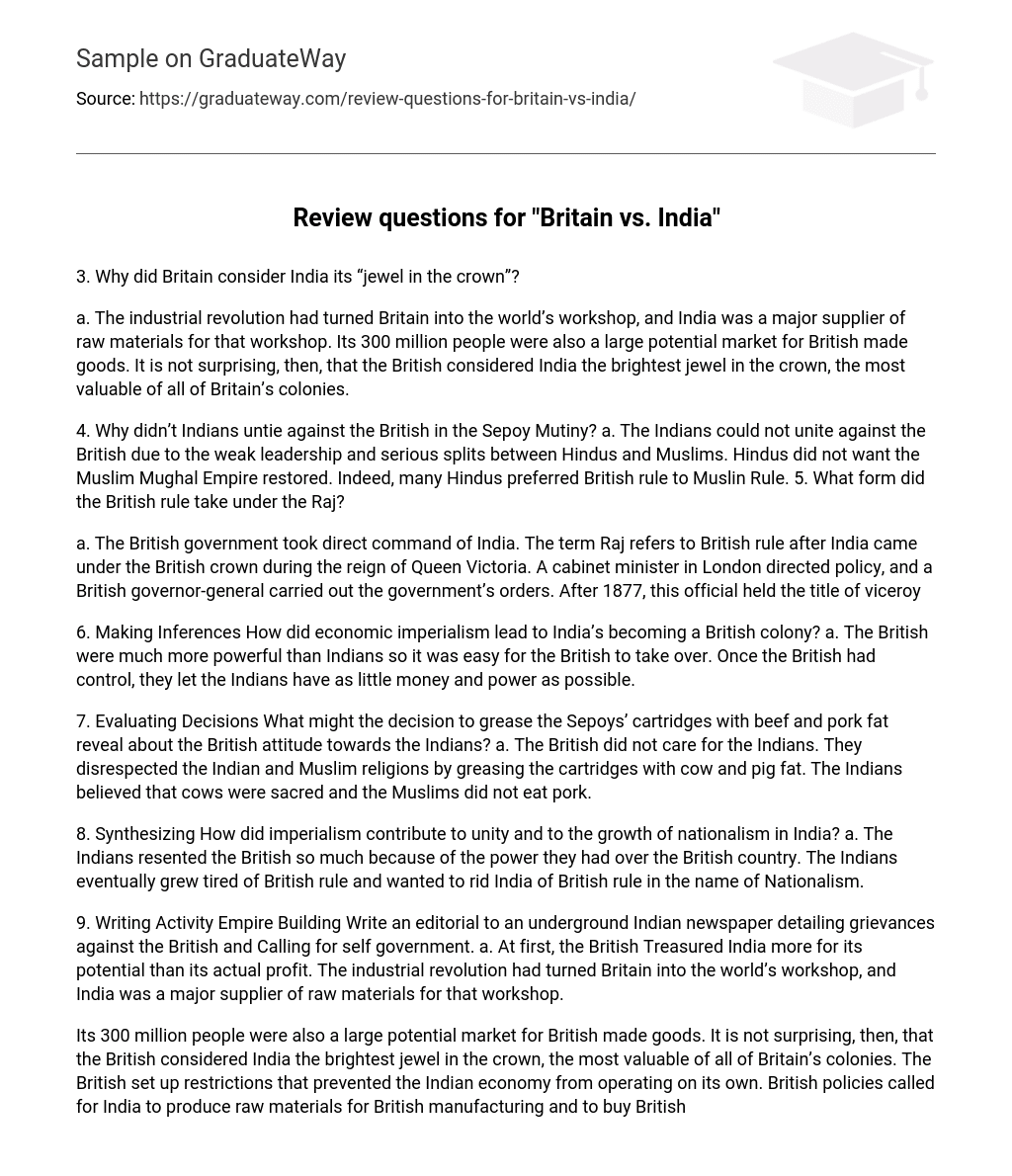The reason why Britain considered India its “jewel in the crown” is a topic of interest.
The industrial revolution transformed Britain into the global center of manufacturing, with India being a significant provider of raw materials for British industry. With its population of 300 million, India presented a substantial market for British products. Consequently, India was regarded as the most prized colony and the ultimate asset by the British.
4. The Indians were unable to unite against the British during the Sepoy Mutiny due to weak leadership and significant divisions between Hindus and Muslims. Hindus opposed the restoration of the Muslim Mughal Empire and, in fact, some preferred British rule over Muslim rule.
5. Under the Raj, the British rule took what form?
The British government directly commanded India during the period known as the Raj, which refers to British rule after India came under the British crown during Queen Victoria’s reign. Policy was directed by a cabinet minister in London, and a governor-general acted on the government’s orders. From 1877 onwards, this official held the title of viceroy.
6. Economic imperialism led to India’s colonization by the British due to the significant power imbalance between the two. The British, being much more powerful, effortlessly took control over India and subsequently oppressed the Indians by limiting their financial resources and authority.
7. The decision to grease the Sepoys’ cartridges with beef and pork fat suggests the British disregard and disrespect towards the Indian and Muslim religions. The Indians, who consider cows sacred, and the Muslims, who do not eat pork, would be offended by this act.
8. The discontent and resentment towards British rule in India led to a desire for national independence as a means to unify the country and challenge imperialism. The Indians recognized the power and control that the British exerted, fueling their determination to rid India of British rule in the pursuit of nationalism.
9. In the writing activity of Empire Building, compose an editorial for an underground Indian newspaper. This editorial should outline the grievances against the British and advocate for self-government.
a. Initially, the British valued India not only for its existing profit but also for its potential. The industrial revolution had transformed Britain into the global center of manufacturing, and India played a crucial role as a supplier of raw materials for this manufacturing hub.
India’s population of 300 million people presented a significant potential market for British goods. Consequently, the British regarded India as their most valuable colony and set up regulations to prevent the Indian economy from functioning independently. These policies required India to produce raw materials for British manufacturing and purchase British goods while barring competition with British products. The establishment of a railroad network in India further enhanced its importance to the British, allowing for the transportation of raw materials and manufactured goods. However, the British held sway over Indian politics and economics, restricting Indian-owned industries and prioritizing cash crops. This shift led to a decline in self-sufficiency for villagers, resulting in famines in the late 1800s. Despite officially adopting a hands-off approach towards Indian religious and social customs, the British presence, including missionaries and the prevailing racist attitudes of British officials, threatened traditional Indian life. By 1850, the British ruled over most of the Indian subcontinent; yet, pockets of dissent persisted. Many Indians believed that along with controlling their land, the British were attempting to convert them to Christianity.
The British expressed constant racism towards the Indian people, which resulted in resentment and nationalism. Economic problems in India further heightened these feelings. In 1857, gossip spread among the Indian soldiers, known as sepoys, that the new Enfield rifles’ cartridges were greased with beef and pork fat. To use these cartridges, the soldiers had to bite off the ends. This news outraged both Hindus, who consider cows sacred, and Muslims, who abstain from eating pork. Lord Kitchener’s quote, “It is this consciousness of the inherent superiority of the European which has won for us India. However well educated and clever a native may be, and however brave he may prove himself, I believe that no rank we can bestow on him would cause him to be considered an equal of the British officer,” exemplifies the British ignorance. In reality, there is no inherent difference between British and Indian people apart from their religious beliefs. Religious differences should not make a British officer superior to an Indian.
The mutiny escalated the mistrust between the British and the Indians. An political paper proposed that both Hindus and Muslims “are being destroyed under the tyranny and oppression of the deceitful English.” In the early 1800s, certain Indians began demanding increased modernization and a larger role in self-governance. Ram Mohun Roy, an educated and forward-thinking Indian, launched a campaign to steer India away from traditional customs and ideas. He believed that if these practices remained unchanged, India would continue to be dominated by foreigners. Roy’s writings inspired other Indian reformers to advocate for the adoption of Western ways. Additionally, Roy established a social reform movement dedicated to bringing about change in India. Alongside modernization and Westernization, nationalist sentiments began to emerge in India. Indians detested a system that relegated them to second-class citizens in their own nation.
Indians in the Indian Civil Service were prohibited from occupying top positions and those who secured middle-level jobs were paid significantly less than Europeans. This discrimination subjected Indians to inferior treatment within their own nation, including racial bias, unfair working conditions conflicting with their religious beliefs, and meager wages. By controlling the economy, agriculture, and assuming the highest-ranking roles, the British further marginalize Indians, displaying both arrogance and ethnocentrism. Their rapid imperialism involved seizing Indian land without mercy.





